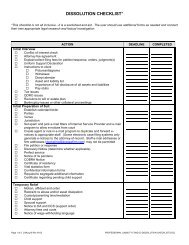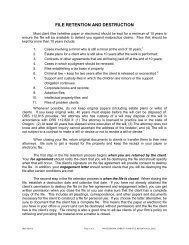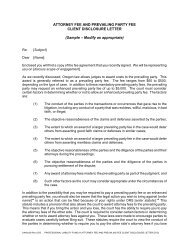oregon statutes of limitations - generally - Professional Liability Fund
oregon statutes of limitations - generally - Professional Liability Fund
oregon statutes of limitations - generally - Professional Liability Fund
Create successful ePaper yourself
Turn your PDF publications into a flip-book with our unique Google optimized e-Paper software.
OREGON STATUTES OF LIMITATIONS - GENERALLY<br />
ORS chapter 12 sets out most <strong>of</strong> the <strong>statutes</strong> <strong>of</strong> <strong>limitations</strong> or refers you to other chapters where<br />
particular <strong>statutes</strong> <strong>of</strong> <strong>limitations</strong> are set forth. Identifying the applicable statute <strong>of</strong> <strong>limitations</strong> –<br />
and knowing how its language will be construed by the court – is critically important, so make<br />
sure you consider carefully those things.<br />
The time for determining a statute <strong>of</strong> <strong>limitations</strong> excludes the first day or day <strong>of</strong> the occurrence<br />
and includes the last day, unless it falls on a holiday or weekend, in which case it includes the<br />
next judicial working day. In other words, if the date <strong>of</strong> the occurrence is on January 1, 2005<br />
and the statute <strong>of</strong> <strong>limitations</strong> is 2 years, you start counting on January 2, 2005. Absent<br />
application <strong>of</strong> a discovery rule, the 2-year time limit would expire on January 1, 2007, unless<br />
that day is a Saturday, Sunday or legal holiday, in which case the statute would expire on the<br />
next day that is a judicial working day. Civil procedural <strong>statutes</strong> providing that something must<br />
be done within one or more years are to be computed by “calendar years.” ORS 174.020.<br />
An action is deemed commenced on the date <strong>of</strong> filing a complaint if service is completed in the<br />
proper manner within 60 days from the filing date. Otherwise, an action is deemed commenced<br />
on the date <strong>of</strong> proper service <strong>of</strong> the complaint. However, ORS 12.220 provides that,<br />
notwithstanding ORS 12.020, if an action was timely filed (but not served within 60 days) and<br />
dismissed on a ground not adjudicating the merits (including lack <strong>of</strong> service), a plaintiff can bring<br />
a new action based on the same claim which will not be time-barred if (1) the defendant had<br />
actual notice <strong>of</strong> the filing <strong>of</strong> the original action within 60 days after the action was filed; (2) the<br />
new action is filed within 180 days after the judgment dismissing the original action is entered.<br />
The following are the most commonly used <strong>statutes</strong> <strong>of</strong> <strong>limitations</strong>:<br />
1 year Garnishments (1 year from delivery <strong>of</strong> writ)<br />
2 years Personal injury, including actions by minors and other incapacitated<br />
persons against government entities. If a minor or other incapacitated<br />
person is suing an entity other than a governmental agency, then it is 1<br />
year after the disability ceases, but not more than 5 years, and 1 year<br />
after death.<br />
Unless a policy provides a longer period, the statute <strong>of</strong> <strong>limitations</strong> for<br />
bringing a UM/UIM claim requires either that, within two years <strong>of</strong> the date<br />
<strong>of</strong> the accident, the insured sues the insurer or, if the insured sues the<br />
uninsured or underinsured tortfeasor, then within two years <strong>of</strong> the date <strong>of</strong><br />
settlement or final judgment, the insured must formally institute arbitration<br />
or sue the insurer.<br />
3 years Wrongful death<br />
5 years Contracts on real property (5 years from date <strong>of</strong> maturity <strong>of</strong> final payment)<br />
6 years Property damage and most other contracts<br />
10 years Title to real property (adverse possession)<br />
[27Oct05 Rev 10/05]<br />
-1- PROFESSIONAL LIABILITY FUND (5-STATUTE OF LIMITATIONS.DOC)
180 day notice TORT CLAIMS - All public bodies, including state, local, and<br />
intergovernmental agencies, school districts, some hospitals, individuals<br />
and entities listed in ORS 30.260-30.300, must be given proper notice <strong>of</strong><br />
a claim, in writing, within 180 days <strong>of</strong> the date <strong>of</strong> the occurrence. You<br />
may exclude the first 90 days if the injured party is unable to give notice<br />
because <strong>of</strong> the injury or because <strong>of</strong> minority or other incapacity. In a<br />
wrongful death claim, the personal representative has one year to give<br />
proper notice.<br />
DRAM SHOP - The person asserting the claim to give a claim notice to a<br />
licensee, permittee or social host before a personal injury claim or<br />
wrongful death claim can be commenced. For a personal injury claim,<br />
notice must be given within 180 days after injury occurs, or within 180<br />
days after the discovery <strong>of</strong> a claim, whichever is later. For a wrongful<br />
death claim, notice must be given within one year after death, or within<br />
one year after discovery <strong>of</strong> the claim by the person asserting the claim,<br />
whichever is later. The claim period for personal injury and wrongful<br />
death claims is tolled when the claimant is: (1) under 18 years <strong>of</strong> age; (2)<br />
unable to give notice by reason <strong>of</strong> injury, financial incapability or<br />
incapacity; or (3) unable to determine the tortfeasor is liable because that<br />
person asserts a right against self-incrimination and cannot be compelled<br />
to reveal the identity <strong>of</strong> the tortfeasor or the facts establishing liability.<br />
PRODUCT LIABILITY CIVIL ACTIONS - ORS 30.905 (dealing with product liability civil actions)<br />
was has a “discovery rule” and provides that, in the event <strong>of</strong> death, such actions must be<br />
commenced not later than the earlier <strong>of</strong> (1) 3 years from date <strong>of</strong> death; or (2) 10 years after the<br />
product was first purchased for use or consumption. These amendments only apply to deaths<br />
or injuries that occur on or after January 1, 2004. However, certain product liability civil actions<br />
filed before January 1, 2004 are revived if (1) the action was filed within the time provided by<br />
ORS 30.905 as amended; (2) the action was adjudicated under the former provisions before<br />
January 1, 2004; and (3) a final judgment was entered on or after June 8, 2001 and before<br />
January 1, 2004. A revived action must be refiled within 1 year <strong>of</strong> January 4, 2004.<br />
Note: ORS 12.160 eliminates the tolling <strong>of</strong> the statute <strong>of</strong> <strong>limitations</strong> by reason <strong>of</strong> imprisonment.<br />
Any person affected may bring an action within the time that would otherwise have been<br />
allowed under former ORS 12.160, whichever expires earlier.<br />
OTHER COMMONLY MISSED STATUTES OF LIMITATION<br />
2 years California personal injury and wrongful death actions. CCP Section 335.1<br />
effective 1/1/03. Consult counsel in California and review applicable <strong>statutes</strong><br />
for more information.<br />
3 years Washington personal injury actions. Consult counsel in Washington and review<br />
applicable code provisions for more information.<br />
[27Oct05 Rev 10/05]<br />
-2- PROFESSIONAL LIABILITY FUND (5-STATUTE OF LIMITATIONS.DOC)

















